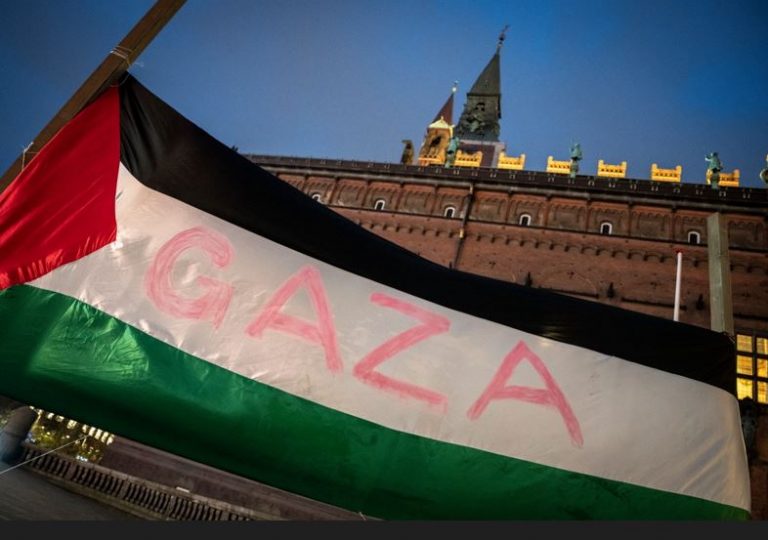News
Hamas Attacks Aid Workers In Gaza, Kills Five

A US- and Israeli-backed charity operating in Gaza accused Palestinian militant group Hamas of attacking aid workers en route to a distribution centre on Wednesday, saying at least five people were killed.
The Gaza Humanitarian Foundation said a bus carrying its staff to a distribution site near Khan Yunis in the south was “brutally attacked by Hamas” around 10:00 pm (1900 GMT).
“We are still gathering facts, but what we know is devastating: there are at least five fatalities, multiple injuries, and fear that some of our team members may have been taken hostage,” GHF said in a statement.
In an email to AFP, the group added that all five of the people killed were Palestinian aid workers for GHF.
“These were aid workers. Humanitarians. Fathers, brothers, sons, and friends, who were risking their lives every day to help others,” the group said in its statement condemning the attack.
The distribution of food and basic supplies in the besieged Gaza Strip has become increasingly fraught and perilous, exacerbating the territory’s deep hunger crisis.
READ ALSO: 17 Palestinians Killed In Israeli Strikes Near Gaza Aid Site
Dozens of Palestinians have been killed while trying to reach distribution points since late May, according to Gaza’s civil defence.
It said Israeli forces killed 31 people waiting for aid on Wednesday.
The Israeli army did not immediately respond to an AFP request for comment about the incident.
– ‘Died while waiting’ –
The GHF, an officially private effort with opaque funding, began operating on May 26 after Israel completely cut off supplies into Gaza for more than two months, sparking international outcry and warnings of imminent famine.
During its first week of operations, the GHF said it distributed more than seven million meals’ worth of food, but its operations were heavily criticised even before the string of deadly incidents near its sites.
The United Nations and major aid groups have refused to work with the GHF, citing concerns over its practices and neutrality.
READ ALSO: June 12 Protest: Security Operatives Barricade N’Assembly Gate
The amount of aid being allowed back into the territory, meanwhile, has been described as only a trickle.
Gaza’s medics have said hospitals were being inundated with people attacked while trying to obtain food.
Al-Awda Hospital in the Nuseirat Camp said early Thursday that four people were killed and 100 wounded in an overnight Israeli drone attack on a gathering at an aid distribution site close to a key checkpoint along the road to northern Gaza.
At Gaza City’s Al-Shifa Hospital, the emergency room said it had started receiving dozens of victims who had been waiting for aid, including 200 in a single day.
“Many Gazans went to the Nabulsi and Netzarim areas to receive aid and were shot at and shelled with tanks,” said Mutaz Harara, head of Al-Shifa’s emergency department.
READ ALSO: Israel Threatens To Do To Iran What It Has Done To Hamas
But with few medical supplies and no operating rooms, “many patients died while waiting for their turn”, he said.
– Convoys through Egypt? –
To combat the widespread shortages, two activist convoys are attempting to transport supplies to the Gaza border themselves.
The Soumoud convoy — meaning steadfastness in Arabic — left Tunis in buses and cars on Monday, hoping to pass through divided Libya and Egypt.
The Global March to Gaza, which is coordinating with Soumoud, said it is organising a separate mobilisation starting in Cairo on Friday.
The plan entails participants marching through the heavily securitised Sinai Peninsula on foot and camping on the Egyptian side of the Rafah border crossing.
Israel’s defence minister objected to the mobilisation and said he expects Egyptian authorities to prevent the arrival of jihadist protesters at the Egypt-Israel border.
READ ALSO: Gaza Talks: Pick A Side Between Us Or Hamas — Israeli PM Tells Qatar
Such actions “would endanger the safety of (Israeli) soldiers and will not be allowed,” Defence Minister Israel Katz said Wednesday.
Egypt said that while it backs efforts to put “pressure on Israel” to lift its blockade on Gaza, any foreign delegations seeking to visit the border area must receive prior approval.
With international and domestic pressure on the Israeli government mounting, Prime Minister Benjamin Netanyahu survived the latest challenge to his right-wing coalition early Thursday.
A bill to dissolve parliament — which could have led to snap polls — was narrowly defeated, with 61 members of the Knesset voting against it, and 53 in favour.
The opposition had hoped to leverage dissatisfaction with Netanyahu over proposals to enlist ultra-Orthodox men typically exempt from the military draft. But ultimately, the ultra-Orthodox parties did not back the effort.
The Gaza war was sparked by Hamas’s October 7, 2023, attack on Israel, which resulted in the deaths of 1,219 people on the Israeli side, mostly civilians, according to an AFP tally of official figures.
The health ministry in Hamas-run Gaza says the retaliatory Israeli military offensive has killed at least 55,104 people, the majority civilians. The United Nations considers these figures to be reliable.
Out of 251 taken hostage during the Hamas attack, 54 are still held in Gaza, including 32, the Israeli military says, are dead.
AFP
News
Court Dissolves Petitioner’s Marriage Over Lack Of Love, Care

An Area Court sitting at Centre-Igboro, Ilorin in Kwara State, on Thursday, dissolved the four-year-old marriage between Aminat Mustapha and Wahab Adeshina, following the petitioner’s insistence.
The petitioner told the court that she was no longer interested in her marriage to her husband following claims of lack of love and care.
According to the News Agency of Nigeria (NAN), while delivering ruling, the presiding judge, Mr Toyin Aluko, held that the respondent had written to the court, accepting the divorce application made by his wife.
READ ALSO:Why I Charged My Husband Money For Sex —Woman
Aluko, consequently, dissolved the marriage between the parties, and ordered the woman to observe one month iddah (waiting period) before she could remarry.
Meanwhile, the court granted custody of the two children in the marriage, ages one and three, to their mother.
He ordered the father to pay a monthly sum of N20,000 for the children’s feeding and maintenance.
The court also held that the respondent will be responsible for their education and healthcare.
Again, the court held that the father has unrestricted access to his children, but at reasonable time adding that he should be notified before any decision is taken on his children.
The judge ordered the petitioner to get a copy of the judgment and send same to the respondent.
News
Tinubu Embarks On Three-state Visit

President Bola Ahmed Tinubu will depart Abuja on Saturday on a working visit to Borno, Bauchi and Lagos.
This is contained in a statement issued by Presidential Spokesperson, Mr Bayo Onanuga, on Friday in Abuja.
While in Borno, the President will commission projects executed by the Borno State Government under Gov. Babagana Zulum, in collaboration with the Federal Government.
He will also attend the wedding ceremony of Sadeeq Sheriff, son of former Borno Governor, Sen. Ali Modu Sheriff, and his bride, Hadiza Kam Salem.
READ ALSO:Ambassadorial Nominees: Ndume Asks Tinubu To Withdraw List
From Maiduguri, Tinubu will proceed to Bauchi State to condole with the state government and the family of Sheikh Dahiru Bauchi, the renowned Islamic cleric and leader of the Tijjaniyya Muslim Brotherhood.
Sheikh Dahiru Bauchi died on Nov. 27.
After the condolence visit, the President will travel to Lagos, where he will spend the end-of-year holidays.
During his stay in Lagos, Tinubu is expected to attend several engagements, including the Eyo Festival scheduled for Dec. 27.
The festival, to be held at Tafawa Balewa Square, will honour notable personalities, including the President’s late mother, Alhaja Abibatu Mogaji, former Lagos State governors Alhaji Lateef Jakande and Chief Michael Otedola.
News
My Wife Dented My Image, Took Our Marital Crises To Radio Stations — Husband

…He ran away from home after I was delivered of twins —Wife
Grade A Customary Court sitting at Mapo, Ibadan, Oyo State, has ruled that a couple, Folaji and Ifedayo should go their different ways after it pronounced their marriage dissolved.
The court president, Mrs S.M Akintayo, who gave the judgment, stated that this was imperative to dissolve the marriage for peace to reign.
The plaintiff, Folaji, who dragged his wife to court, accused her of not loving him, always fighting him, and sometimes displaying violence.
Folaji explained that the root of their differences was Ifedayo’s bias for his mode of worship.
According to the plaintiff, he attends a white garment church, which mode of worship the defendant abhors and therefore refused to attend services with him.
Folaji also said that Ifedayo concealed from him the fact that she was suffering from a particular ailment, which he became aware of after she was advised at the hospital to carry out series of tests.
Folaji stated that the differences between him and his wife degenerated to the level that he became a regular face at the police station and also at radio stations, where his wife took their matters to.
READ ALSO:‘My Husband Kept Coffin Under Our Bed, Planned To Use Our Child For Ritual’
The plaintiff told the court that the defendant had done a lot of damage to his image, and thus prayed the court to put an end to their relationship so that he could pick up the pieces of his life.
The plaintiff sought easy access to their children and promised to give them feeding allowance weekly.
He further requested an order restraining his wife from threatening him and from interfering with his private life.
Ifedayo, in her response, agreed that their union be dissolved.
She stated that her husband was inhumane and that he packed out of their house before she was discharged from the hospital after she put to bed a set of twins.
The defendant further said that the plaintiff had never visited her and their children since he walked out of their marriage.
According to her, her husband sent her N20,000 through his counsel after he dragged her to court, but that she declined it because it was a ridiculous amount to feed a set of twins.
Folaji, in his testimony, said: “My lord, my wife, and I had a proper wedding, and I paid her bride price.
“I expected my wife to be submissive to me and do my binding, but the reverse is the case.
“My wife is stubborn and troublesome.
READ ALSO:My Husband Felt Insecure After I Got A Job, Accused Me Of Infidelity —Wife
“She swore never to attend my church because it’s a white garment church and that she loathes our way of worship.
“The more I encouraged her to attend, the more she kept her distance.
“She later reluctantly agreed to attend service once a month.
“My wife is secretive. She hid from me for years the fact that she was nursing an ailment. I only became aware of this when the doctor confirmed it after she went through a series of tests when she took ill.
“My wife, rather than being remorseful, decided to make life tough for me.
“She became troublesome and never ceased to fight me.
“She is violent and always hit and harmed me with any dangerous objects within her reach.
“We always dragged ourselves to the police station where we became a regular face.
“My wife, determined to dent my image, took our issues to radio stations where I was invited and our differences were aired.
READ ALSO:My Husband Felt Insecure After I Got A Job, Accused Me Of Infidelity —Wife
“I walked out of our marriage when I could no longer tolerate my wife’s misbehaviour.
“She reported me again at the welfare office and, after mediating in our differences, I was asked to provide her with foodstuff and not money, which I did on a regular basis.
“But she has insisted that I would not have rest of mind.
“I pray this court to dissolve our marriage and grant me free access to our children. I promise to make provision for their upkeep on a weekly basis.
“I further request an order restraining my wife from threatening and interfering with my private life.”
Ifedayo, in her response, said: “I agree that our marriage be dissolved. My husband is inhumane and has no conscience, which were the causes of the crisis we experienced in our marriage.
“I was admitted in the hospital to be delivered of our set of twins, but I returned to meet an empty house. My husband deserted me and our newborn children.
READ ALSO:My Husband Shows His Other Wives More Affection, Woman Tells Court
“He never checked on them nor gave anything for their upkeep. He only gave them N20,000 of recent through his counsel after he came to court.
“I rejected the money because such an amount can not feed sufficiently two children of their age, not to mention other needs.
“I plead that the court grant me custody of our children and make my husband responsible for their upkeep.
“I want him to give attention to their feeding and pay their school fees as and when due.
“He should likewise be available any time they need medical attention.”
Giving her judgment, Mrs Akintayo said although both had a valid customary marriage and bride price was paid, the court had no choice than to grant their prayers of divorce since they now express their disinterest in it.
Akintayo ruled that they were no longer husband and wife.
She granted custody of their children to the defendant, stating that they were still minors in need of motherly care.
The defendant was granted access to their children on a weekly basis while he was ordered to be responsible for their welfare.

 News4 days ago
News4 days agoWage Dispute: Court Orders PSG To Pay Mbappe €61 Million

 Headline4 days ago
Headline4 days agoAircraft Crashes In Owerri With Four Persons Onboard

 Sports4 days ago
Sports4 days agoJUST IN: Dembélé Named FIFA Best Men’s Player, Bonmatí Wins Women’s Award

 Metro3 days ago
Metro3 days agoAlleged Organ Harvesting: Bereaved Families Rush To Check Corpses

 Business4 days ago
Business4 days ago9th FirstBank Digital Xperience Centre Launched In UNIBEN

 News4 days ago
News4 days agoOkpebholo Presents ₦939.85bn ‘Budget Of Hope, Growth’ To Edo Assembly

 Business4 days ago
Business4 days agoCBN Revokes Licences Of Aso Savings, Union Homes As NDIC Begins Deposit Payments

 News4 days ago
News4 days agoTrump Places Nigeria, 14 Others On Partial Travel Restrictions To US

 News3 days ago
News3 days agoForest Reserve: Okpebholo Broker Peace Between Host Communities, Investors

 News4 days ago
News4 days agoOPINION: Man-of-the-people, Man-of-himself


























